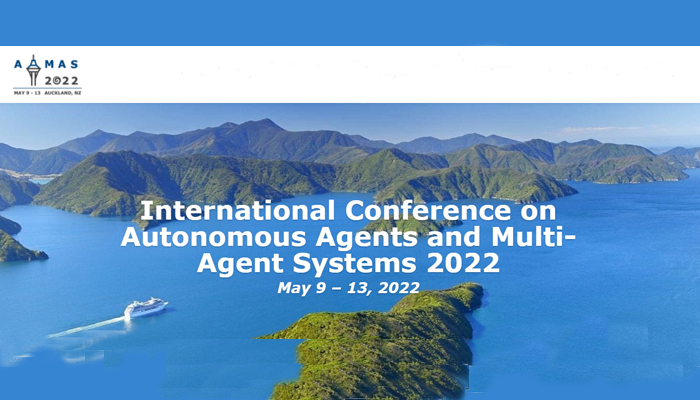Faculty and students from Machine Learning Lab (MLL) presented the following papers at the 21st International Conference on Autonomous Agents and Multiagent Systems (AAMAS’22) held online from 9 – 13 May, Auckland, New Zealand.
- Multi-unit Double Auctions: Equilibrium Analysis and Bidding Strategy using DDPG in Smart-grids – Dr. Sujit Gujar; Dr. Praveen Paruchuri; Sanjay Chandlekar, MS by research; Easwar Subramanian and Sanjay Bhat, TCS Innovation Labs Hyderabad.
Research work as explained by the authors: We present a Nash equilibrium analysis for single-buyer single-seller multi-unit k-double auctions for scaling-based bidding strategies. We then design a Deep Deterministic Policy Gradient (DDPG) based learning strategy, DDPGBBS, for a participating agent to suggest bids that approximately achieve the above Nash equilibrium. We expand DDPGBBS to be helpful in more complex settings with multiple buyers/sellers trading multiple units in a Periodic Double Auction (PDA), such as the wholesale market in smart-grids. We demonstrate the efficacy of DDPGBBS with Power Trading Agent Competition’s (PowerTAC) wholesale market PDA as a testbed.
Link to full paper: https://dl.acm.org/doi/pdf/10.5555/3535850.3536037
- REFORM: Reputation Based Fair and Temporal Reward Framework for Crowdsourcing – Samhita Kanaparthy, Sankarshan Damle, and Dr. Sujit Gujar.
Research work as explained by the authors: Crowdsourcing is an effective method to collect data by employing distributed human population. Researchers introduce appropriate reward mechanisms to incentivize agents to report accurately. In particular, this paper focuses on Peer-Based Mechanisms (PBMs). We observe that with PBMs, crowdsourcing systems may not be fair, i.e., agents may not receive the deserved rewards despite investing efforts and reporting truthfully. Unfair rewards for the agents may discourage participation. This paper aims to build a general framework that assures fairness for PBMs in temporal settings, i.e., settings that prefer early reports. Towards this, we introduce two general notions of fairness for PBMs, namely gamma-fairness and qualitative fairness. To satisfy these notions, our framework provides trustworthy agents with additional chances of pairing. We introduce Temporal Reputation Model (TERM) to quantify agents’ trustworthiness across tasks. With TERM as the key constituent, we present our iterative framework, REFORM, that can adopt the reward scheme of any existing PBM. We demonstrate REFORM’s significance by deploying the framework with RPTSC’s reward scheme. Specifically, we prove that REFORM with RPTSC considerably improves fairness; while incentivizing truthful and early reports. We conduct synthetic simulations and show that our framework provides improved fairness over RPTSC.
- Welfare Optimal Combinatorial Civic Crowdfunding with Budgeted Agents – Sankarshan Damle, Manisha Padala and Dr Sujit Gujar at 4th Games, Agents, and Incentives Workshop held at AAMAS 2022 (GAIW@AAMAS’22)
Research work as explained by the authors: Civic Crowdfunding (CC) uses the “power of the crowd” to garner contributions towards public projects. As these projects are
non-excludable, agents may prefer to “free-ride,” resulting in the project not being funded. For single project CC, researchers propose to provide refunds to incentivize agents to contribute, thereby guaranteeing the project’s funding. These funding guarantees are applicable only when agents have an unlimited budget. This work focuses on a combinatorial setting, where multiple projects are available for CC and agents have a limited budget. We study certain specific conditions where funding can be guaranteed. Further, funding the optimal social welfare subset of projects is desirable when every available project cannot be funded due to budget restrictions. We prove the impossibility of achieving optimal welfare at equilibrium for any monotone refund scheme. We then study different heuristics that the agents can use to contribute to the projects in practice. Through simulations, we demonstrate the heuristics’ performance as the average-case trade-off between welfare obtained and agent utility.
- Budgeted Combinatorial Multi-Armed Bandits – Debojit Das; Dr. Sujit Gujar and Dr. Shweta Jain, IIT Ropar.
Research work as explained by the authors: We consider a budgeted combinatorial multi-armed bandit setting where, in every round, the algorithm selects a super-arm consisting of one or more arms. The goal is to minimize the total expected regret after all rounds within a limited budget. Existing techniques in this literature either fix the budget per round or fix the number of arms pulled in each round. Our setting is more general where based on the remaining budget and remaining number of rounds, the algorithm can decide how many arms to be pulled in each round. First, we propose CBwK-Greedy-UCB algorithm, which uses a greedy technique, CBwK-Greedy, to allocate the arms to the rounds. Next, we propose a reduction of this problem to Bandits with Knapsacks (BwK) with a single pull. With this reduction, we propose CBwK-LP-UCB that uses PrimalDualBwK ingeniously. We rigorously prove regret bounds for CBwK-LP-UCB. We experimentally compare the two algorithms and observe that CBwK-GreedyUCB performs incrementally better than CBwK-LP-UCB. We also show that for very high budgets, the regret goes to zero.
Keywords Combinatorial MAB · Budgeted MAB · Crowdsourcing · Heterogeneous Arms
Link to full paper: https://arxiv.org/pdf/2202.03704.pdf
The International Conference on Autonomous Agents and Multiagent Systems (AAMAS) is the largest and most influential conference in the area of agents and multiagent systems. The aim of the conference is to bring together researchers and practitioners in all areas of agent technology and to provide a single, high-profile, internationally renowned forum for research in the theory and practice of autonomous agents and multiagent systems. AAMAS is the flagship conference of the non-profit International Foundation for Autonomous Agents and Multiagent Systems (IFAAMAS).
The AAMAS conference series was initiated in 2002 in Bologna, Italy as a joint event comprising the 6th International Conference on Autonomous Agents (AA), the 5th International Conference on Multiagent Systems (ICMAS), and the 9th International Workshop on Agent Theories, Architectures, and Languages (ATAL).

